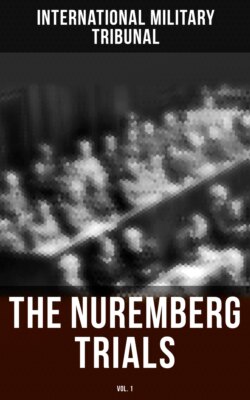Читать книгу The Nuremberg Trials (Vol.1) - International Military Tribunal - Страница 35
На сайте Литреса книга снята с продажи.
(E) PLUNDER OF PUBLIC AND PRIVATE PROPERTY
ОглавлениеThe defendants ruthlessly exploited the people and the material resources of the countries they occupied, in order to strengthen the Nazi war machine, to depopulate and impoverish the rest of Europe, to enrich themselves and their adherents, and to promote German economic supremacy over Europe.
The defendants engaged in the following acts and practices, among others:
| 1. | They degraded the standard of life of the people of occupied countries and caused starvation, by stripping occupied countries of foodstuffs for removal to Germany. |
| 2. | They seized raw materials and industrial machinery in all of the occupied countries, removed them to Germany and used them in the interest of the German war effort and the German economy. |
| 3. | In all the occupied countries, in varying degrees, they confiscated businesses, plants, and other property. |
| 4. | In an attempt to give color of legality to illegal acquisitions of property, they forced owners of property to go through the forms of “voluntary” and “legal” transfers. |
| 5. | They established comprehensive controls over the economies of all of the occupied countries and directed their resources, their production and their labor in the interests of the German war economy, depriving the local populations of the products of essential industries. |
| 6. | By a variety of financial mechanisms, they despoiled all of the occupied countries of essential commodities and accumulated wealth, debased the local currency systems and disrupted the local economies. They financed extensive purchases in occupied countries through clearing arrangements by which they exacted loans from the occupied countries. They imposed occupation levies, exacted financial contributions, and issued occupation currency, far in excess of occupation costs. They used these excess funds to finance the purchase of business properties and supplies in the occupied countries. |
| 7. | They abrogated the rights of the local populations in the occupied portions of the U.S.S.R. and in Poland and in other countries to develop or manage agricultural and industrial properties, and reserved this area for exclusive settlement, development, and ownership by Germans and their so-called racial brethren. |
| 8. | In further development of their plan of criminal exploitation, they destroyed industrial cities, cultural monuments, scientific institutions, and property of all types in the occupied territories to eliminate the possibility of competition with Germany. |
| 9. | From their program of terror, slavery, spoliation, and organized outrage, the Nazi conspirators created an instrument for the personal profit and aggrandizement of themselves and their adherents. They secured for themselves and their adherents: |
| (a) | Positions in administration of business involving power, influence, and lucrative perquisites. |
| (b) | The use of cheap forced labor. |
| (c) | The acquisition on advantageous terms of foreign properties, business interests, and raw materials. |
| (d) | The basis for the industrial supremacy of Germany. |
These acts were contrary to international conventions, particularly Articles 46 to 56 inclusive of the Hague Regulations, 1907, the laws and customs of war, the general principles of criminal law as derived from the criminal laws of all civilized nations, the internal penal laws of the countries in which such crimes were committed and to Article 6 (b) of the Charter.
Particulars (by way of example and without prejudice to the production of evidence of other cases) are as follows:
1. Western Countries:
There was plundered from the Western Countries, from 1940 to 1944, works of art, artistic objects, pictures, plastics, furniture, textiles, antique pieces, and similar articles of enormous value to the number of 21,903.
In France statistics show the following:
